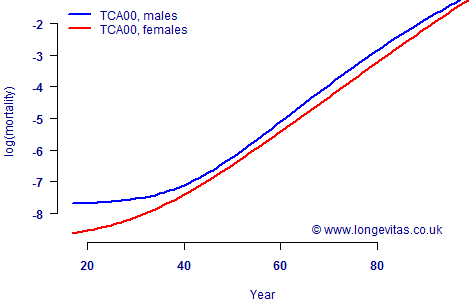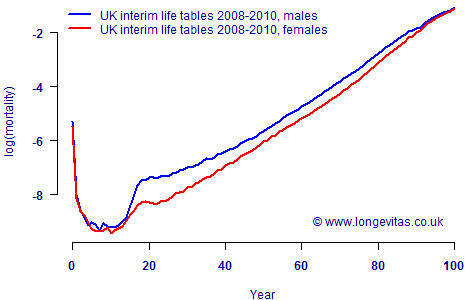Muddled about middle age
Mortality statistics occasionally make the news, usually with some eye-catching statements. Here is a recent example from the BBC:
"Data from life insurance companies suggests that in the fifth and sixth decades of life you are less likely to die over the coming year than at any other time in your life."
David Bainbridge, Just what is middle age?, 23rd November 2011.
This statement is indeed eye-catching. It is also incorrect. Figure 1 shows the mortality rates for assured lives of life companies in the United Kingdom. If we take the "fifth and sixth decades of life" to mean the age range 40–59, then Figure 1 shows that mortality rates are at their lowest for people in their third decade of life, i.e. 20–29.
Figure 1. Log(mortality) according to TMC00 (ultimate) tables. Source: CMI data.

Figure 1 shows mortality rates after graduation, a process of smoothing out fluctuations. Figure 1 also only shows mortality rates above age 17, as people below this age tend not be insured (the CMI's tables only have rates for holders of life-assurance policies). To get a more rounded picture, we can also look at population rates of mortality, as shown in Figure 2:
Figure 2. Log(mortality) according to UK interim life tables for 2008-2010. Source: Government Actuary's Department.

As in Figure 1, the "fifth and sixth decades of life" are still not the ones with the lowest risk. We can clearly see that childhood is the period of lowest risk, as one would expect. We can also see a possible source of confusion in the original article: rates of mortality in infancy are so high that they are only exceeded once people reach their late 50s. However, the ages at which people in the UK are least likely to die are 7 for males and 10 for females, not middle age.
Disclosure. Like Mr Bainbridge, this author is also a male aged 43. He doesn't have a sports car, though.


Add new comment